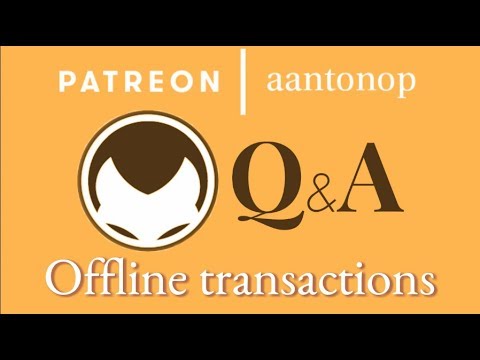Is it possible to do a bitcoin transaction without using the internet? How do transactions from paper wallets and physical bitcoins work? Does this solve the Byzantine Generals’ Problem?
NOTE: OpenDimes utilize some additional security measures, especially regarding key generation, which paper wallets and other physical bitcoins do not. When sealed, the public key is accessible and you are able to check the balance, but you cannot access the private key without unsealing, i.e. breaking part of the hardware device. Learn more about how they work here: https://opendime.com/faq
This question is from the MOOC session 8.2 covering the Byzantine Generals’ Problem, which took place on September 15th 2017. Andreas is a teaching fellow with the University of Nicosia. The first course in their Master of Science in Digital Currency degree, DFIN-511: Introduction to Digital Currencies, is offered for free as an open enrollment MOOC course to anyone interested in learning about the fundamental principles.
If you want early-access to talks and a chance to participate in the monthly live Q&As with Andreas, become a patron: https://www.patreon.com/aantonop
RELATED:
Consensus Algorithms, Blockchain Technology, and Bitcoin – https://youtu.be/fw3WkySh_Ho
Advanced Bitcoin Scripting Part 1: Transactions and Multisig – https://youtu.be/8FeAXjkmDcQ
Advanced Bitcoin Scripting Part 2: SegWit, Consensus, and Trustware – https://youtu.be/pQbeBduVQ4I
What is Consensus: Rules without Rulers – https://youtu.be/2tqo7PX5Pyc
Forkology: A Study of Forks for Newbies – https://youtu.be/rpeceXY1QBM
Bitcoin: Where the Laws of Mathematics Prevail – https://youtu.be/HaJ1hvon0E0
The rules of Bitcoin (part 1) – https://youtu.be/VnQu4uylfOs
The rules of Bitcoin (part 2) – https://youtu.be/vtIp0GP4w1E
Decentralized power, leaderless governance – https://youtu.be/E5VbDlQTPzU
Scaling, trust, and trade-offs – https://youtu.be/vCxmHwqyJWU
Using paper wallets – https://youtu.be/cKehFazo8Pw
Why running a node is important – https://youtu.be/oX0Yrv-6jVs
SegWit adoption – https://youtu.be/KCsTVTRk6I4
Public keys vs. addresses – https://youtu.be/8es3qQWkEiU
How do mnemonic seeds work? – https://youtu.be/wWCIQFNf_8g
Intrinsic vs. extrinsic assets – https://youtu.be/KDtfFNZy9xg
Decentralised exchanges with fiat – https://youtu.be/3Url8tbQEkA
Running nodes and payment channels – https://youtu.be/ndcfBfE_yoY
Secure, tiered storage system – https://youtu.be/uYIVuZgN95M
Solar energy and mining in space – https://youtu.be/cusakcpa8AM
Andreas M. Antonopoulos is a technologist and serial entrepreneur who has become one of the most well-known and respected figures in bitcoin.
Follow on Twitter: @aantonop https://twitter.com/aantonop
Website: https://antonopoulos.com/
He is the author of two books: “Mastering Bitcoin,” published by O’Reilly Media and considered the best technical guide to bitcoin; “The Internet of Money,” a book about why bitcoin matters.
THE INTERNET OF MONEY, v1: https://www.amazon.co.uk/Internet-Money-collection-Andreas-Antonopoulos/dp/1537000454/ref=asap_bc?ie=UTF8
[NEW] THE INTERNET OF MONEY, v2: https://www.amazon.com/Internet-Money-Andreas-M-Antonopoulos/dp/194791006X/ref=asap_bc?ie=UTF8
MASTERING BITCOIN: https://www.amazon.co.uk/Mastering-Bitcoin-Unlocking-Digital-Cryptocurrencies/dp/1449374042
[NEW] MASTERING BITCOIN, 2nd Edition: https://www.amazon.com/Mastering-Bitcoin-Programming-Open-Blockchain/dp/1491954388
Subscribe to the channel to learn more about Bitcoin & open blockchains!
Music: “Unbounded” by Orfan (https://www.facebook.com/Orfan/)
Outro Graphics: Phneep (http://www.phneep.com/)
Outro Art: Rock Barcellos (http://www.rockincomics.com.br/)
source


















I love your channel. Thank you for the knowledge!
We need a way to give money to people via bitcoin the way we do it with cheque. The sender should share a one time key that would validate that exact transaction amount the receiver can later withdraw when he/she's online. Perhaps an offline app on your phone could generate that one time key if we input our private key and the the transaction amount.
I know this may be a biased forum, however, i still want to know if blockchain is a better technology to learn in comparison to neural networks ? I know javascript, swift and python quite well.
TIL Blockstream Satillite
What are your thoughts about eos? Would also appreciate your update about airdrops, sir.
One bitcoin payable to the bearer on demand. Bank notes redeemable in bitcoin from a trusted(sadly) source.
nice video as always!
Hello. Can you please tell me where I can learn about the recent satellite system noted at 4:20 in this video? Thank you from Ontario Canada
What if somebody puts money in a channel(like lightning) that can only be transfered to one address and has to stay in a channel for a month before it is released. In that time period you could get the money by getting a signature from that guy and broadcast it to the smart contract.
I could see an entity/company providing an insurance mechanism for low value transactions just to facilitate such offline activity.
The insurance cost would be some function like *F(size of transaction, age of blockchain ledger copy)*. This would be just like the credit card transactions where you don't have to sign for small transactions because the Card companies have figured out they can make more money by allowing smaller transactions to execute with less verification than larger ones, due to the greater number of transactions that take place in that less restrictive environment. Obviously as either of the two parameters to that hypothetical function get larger the insurance cost quickly increases in a exponential manner, not linearly.
"Popov's Dilemma''
video.like++;
I love you
great, but not only 350b but can transmit bigger data if it is compressed with some high compression protocol.
Smashed the like………
what about paper bitcoin money? I heard someone made it possible with picture proof.
#bitcoinFREDOM #hodl #mineIT #1STcomment